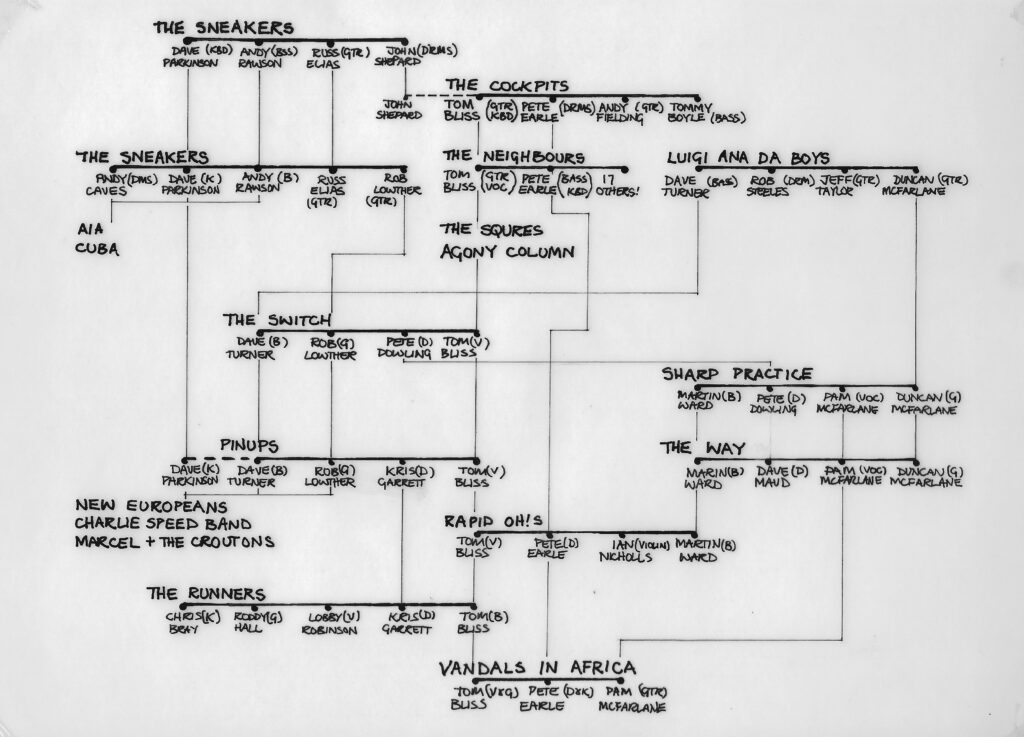Leeds College of Music
I decided to go to Leeds College of Music (LCM) rather than university when I finished school, to start the imaginatively entitled ‘Diploma of Proficiency in Light Music’ course (DPLM). I had settled on Leeds rather vaguely, being attracted by the fact that it seemed to be the only music college in the country that offered a non-classical course, and a somewhat irrational opposition to going to one of the London colleges. The audition had been welcoming, and had included an impressive aural (listening) test in the electronic music suite, part of which involved notating a tune that was being played. Up to now, at school, this had always something classical played on the piano, but at LCM, it was the theme tune to ‘Bless this House’ !
LCM now is an internationally recognised conservatoire, based in a purpose built location next to the BBC, and offering a variety of courses including classical, jazz, folk, rock and instrument building. In the 70s, it was a much more modest affair, housed in the unique Civic Theatre and Institute, adjoining the Thomas Danby School of Art. The art college has similarly expanded in stature, and is now in a modern building in the university quarter of the city. The theatre has now become the Leeds City Museum and although the new building housing the college is much more suited to its role, there is no denying that LCM had a unique charm when I was there, with rehearsal and teaching rooms crammed into the nooks and crannies of a rambling Victorian structure.
The ‘light music’ course was really a jazz course, which was great in many ways, and was the only degree status course offered by the college. Although the qualification was a Diploma, it was recognised as degree equivalent by many academic bodies, enabling me to both complete a post-graduate teaching course when I finished, and also convince people throughout my IT career that I had a degree!.
An interesting co-incidence is that DPLM (Diploma of proficient in Light Music) is also a mnemonic for the first four modes of the major scale, Dorian, Phrygian, Lydian and Mixolydian. Who knew ?
One of the downsides though was that it was heavily focussed on jazz and funk, and also was something of a hot-house environment. My instrument was classed as ‘Percussion with Drum Kit’ so I wasn’t expected to be especially proficient on the drums, specialising more in tuned percussion and timpani, where I could hold my own. My kit playing, on the other hand, was definitely not good enough, and I quickly realised that while I was something of a big fish in a little pond at home in Stratford, in Leeds I definitely needed to up my game.
Leeds in the late 70s was full of music. The punk boom was in full swing, and there were a host of pubs and bars that put on free live music. The University and the Poly (now rebranded as Leeds Metropolitan University) put on big name bands several times a week, and I remember seeing Wilko Johnson, The Undertones, Boomtown Rats, X-Ray Specs amongst others. (Sadly the legendary Who ‘Live at Leeds’ was about 3 years before I arrived, and I would have to wait for another 40 years before I got to see them). There were several music shops in the city centre and they all had notice boards advertising musicians for bands. After a few weeks, I decided to find some people to play with outside of college, who were happy to play something other than jazz funk, and a chance phone call lead me to meet two local musicians, Tom and Andy, who would figure largely in my life in Leeds, both in and out of music.
The Cockpits
Apart from owning a kit, I also had a small Ford Escort van, which I started to realise made me more of a desirable commodity than my drumming prowess. I’m pretty sure that thats what lead to me being invited to join Tom and Andy in their band! They both played guitar and sang, and owned a small pa. In those days there was no miking up of instruments – pub band PAs were vocal mics plugged into 100 watt mixer amps and a couple of speakers. Instruments were played though amps, and the drummers just had play loud! In addition to Andy and Tom, there was another Tom on bass (with a Marshall stack!) and another guitarist, Joy. This rise to our initial band name, Joy Sick and the Cockpits (later shorted to ‘The Cockpits’.
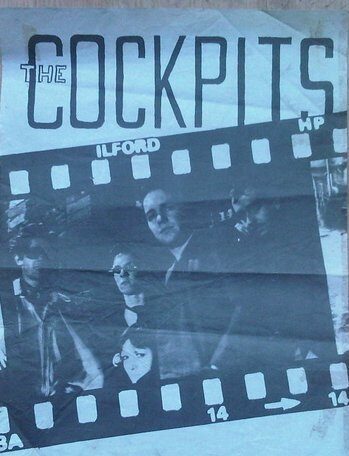
We even did a poster! Im just visible at the back between Tom and Andy, with the eponymous Joy at the front.
Joy didn’t stay with us for very long, but her boy-friend was in a well known local band ‘Foxy Maiden’ (this was the 70s …) and they gave us our first gig as a support slot.
The poster was cunningly designed to look like a photo strip, and we could stick them together to make a diagonal faux film reel.
Our poster campaign was actually more well known than the band. We posted a whole strip against the side to The Fenton pub, which could be seen walking up to the University from the city centre, and repeated the exercise against the gable end of the Packhorse. Everyone knew about us, but hardly anyone had heard us. The Cockpits were short lived – we only did six gigs – but it was my introduction into the lively and vibrant world of the Leeds live music scene.
The Neighbours
The Cockpits only lasted a few months, through the Winter and Spring of 77/78. Tom and Andy’s musical tastes were conflicting, and they decided to go their separate ways musically, although we all remained friends. The scene in Leeds at this time was so vibrant that bands were continuously forming / splitting / reforming. Our own group of friends centred around The Fenton, which was a melting pot for local musos. Andy decided form a more hard core band, “The StaPrests”, and Tom invited me to join him in a new venture which we called ‘The Neighbours’. I had become friendly with another drummer at music college, Phil, and wanted to get him involved with the scene outside college, so I suggested to Tom that he play drums, and I would play bass.
The Neighbours had quite a fluid lineup. We recruited a couple of backing singers, and a guitarist who had been playing with Leeds band ‘Luigi and the Boys‘. I stayed in Leeds for the summer holidays in 1978, and a lot of time was spent round at Tom’s rehearsing and generally hanging out. I had started playing in a working men’s club on Fridays and Saturdays, so was starting to think of myself as a ‘proper’ musician! Unfortunately there aren’t any photos or posters that remain from this time, but I can remember a graphic that Tom made of us peering out of the windows of the house (the neighbours, get it?). By the end of the summer we had added a sax player, Rob, whose family owned a furniture store in Pudsey, giving us a free rehearsal space when the shop was closed.
Like the Cockpits, we didn’t do a lot of gigs, but we had some fun times. I had a friend at Bretton hall College of Education (which is now the West Yorkshire Sculpture Park) and we had a couple of gigs out there. Bretton Hall had been a stately home, and the college was set in expansive grounds in the countryside south of Leeds. The student union was a massive part of their life, being so remote, and it had an atmosphere very different from the pubs of Leeds.
On one memorable occasion, we were driving over there for a gig, when Tom asked me if I had picked up the PA? I was surprised by this, as I didn’t have one, but a break down in communication had led him to believe that I was sorting one out. We realised that all we had was a Vox amp head and a couple of small speakers, that Tom played his guitar through.
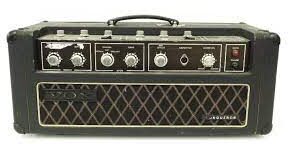
Luckily these heads have two channels, each with two inputs, so we managed to get Tom’s guitar, two vocal mics and the keyboard all plugged in.
I can’t remember it sounding terrible, but expectations were a lot lower then!
Tom reminded me recently of another gig at Bretton Hall in the students’ union, where I discovered a cupboard at the back of the stage and realised that my lead was long enough to allow me to creep into it, and hide there, mid song. Tom turned round, and wondered where the bass player had disappeared to.
As I started my second year at college, I realised that I was going to have to be a bit more circumspect about how much I as earning playing. My grant only covered tuition, and I was keen to support myself as much as possible. I had started playing in a working man’s club, and realised that this was a way to both earn some money, and also improve my kit playing. The downside to this was that it meant working at weekends which were peak gig nights for bands. Reluctantly I had to step down from The Neighbours, which carried on without me for a while.
The Rapid Ohs
Although no longer in the Neighbours, I was still friendly with Tom, and saw a lot of him. The Neighbours dissolved, as bands constantly did, and Tom went on to join The Runners, who were very successful in Leeds, while I carried on playing in the working mens clubs. At one point, Tom told me that he would like to form a small band, that could respond quickly to gig requests. He had a bass player in mind and wanted me to play drums. I had become friendly with a fiddle player at college, Ian, who like me, had shown an interest in doing something outside college, and was keen to do ‘something electric’. Ian would, like Tom, become a lifelong friend, and in about 20 years time, introduce me to bluegrass!
The Rapid Ohs (‘rapidos’) was name that came out of Tom’s concept of ‘The Rapid Deployment Band’. I can’t remember doing a lot of gigs, but it was good to get back into a band environment, and play with Tom again.
Alternative Dance
In my third year at college, I got a regular gig in a pub, which as five nights a week. The Gipton, in Leeds, had a resident organist and drummer, who played Wednesdays to Sunday. This was a much better environment than the working men’s clubs, and the organist was quite into jazz. We played for visiting singers and entertainers, and on nights when there wasn’t a paid entertainer, we played for anyone who wanted to sing. It would be called ‘Open Mic’ now, but for some reason at the Gipton, these were known as ‘Free and Easy’ nights. The Gipton was a good gig because I could leave the kit there, it was decently paid (for the time), and I was playing with a good organist, which meant that my own playing improved. I think that when I finished there, my kit playing was probably the best it ever was.
However, I missed being in a band. Tom was firmly established with The Runners, and would go on to play with local legends Agony Column. I couldn’t really join anyone who wanted to gig a lot as I had the Gipton. A chance meeting however, led to me playing with a guitarist and bass player who wrote their own material, and were more interested in rehearsing and playing for fun than gigging. Alternative Dance was a name that they came up with for one of the few gigs that we did.
This is the only photo that I have of me playing while I was at college. I remember that it was a pub in Bradford, and I must have been in my ‘mod’ era judging by the tie.
At least I’m sitting front of a Marshall head, even if its not a full stack!
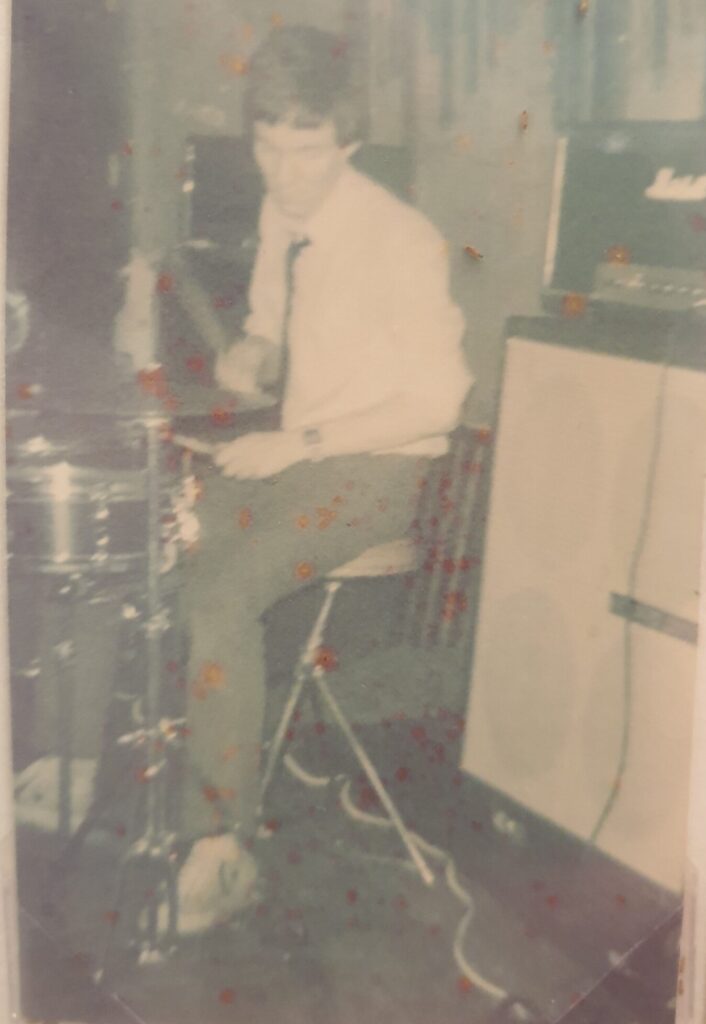
Vandals in Africa
I had left college, graduated from Bretton Hall with a PGCE (Post Graduate Certificate in Education), and was deciding what to do with my life. I put this decision off for a while by going busking in Europe with Ian in the summer or 1982, and when I got back went to see Tom, who had an idea for a new band.
This was the 80s. Soft Cell had changed the Leeds scene with the release of Tainted Love, and everyone was starting to look at synths and electronic music. Tom had always struggled with the logistics of running a large band, which had lead to the stripped down Rapid Ohs.
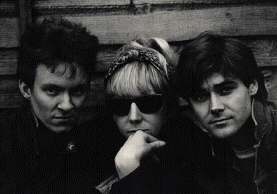
He decided to take this even further with a band that would have the drums and bass on a backing tape, and the vocals, guitar and keyboard live. I would play keyboards, and Pam would sing and play guitar.
Tom had decided to do some retraining after graduation, and did a course in video production, which required a video to be made as a final project. he decided to do a music video, which featured The Vandals. It’s the only time I have ever done music filming. A large segment of the video was filmed one day in Whitby. Tom didn’t appear in these shots, as he was directing, so Pam and myself spent the day as film starts at locations in and around Whitby. It was one of my rare experiences of film work, and a great experience. I still have the video on VHS!
The concept of Vandals worked well in practical terms, but playing with backing tapes never really felt right, so I was quite pleased when Tom suggested getting a ‘real’ drummer and bass player. I knew Dave (bass) from music college and when I introduced him to Tom he fit in straight away. A happy coincidence led to another Dave on drums, and the Vandals were an all-human band.
The Pearl Divers
Probably the most successful and long lived band that I was involved with was the Pearl Divers. The name comes from the Elvis Costello song, ShipBuilding, which includes the line
… diving for dear life, when we should be diving for pearls ..
The vandals had come to a natural end as our lives moved from student to professional. I retrained as a software engineer and Tom started to work in the media industry. Ian moved to London to set up Kick studios, which would become a successful TV and Film music writing company. We all settled down, bought houses, but still wanted to play in bands!
The Pearl Divers was put together by Tom as a follow on from the Vandals, but with different musicians, apart from myself on keyboard. Another of my music college friends, Maisie, who I had remained in touch with, joined us on backing vocals, with other local musicians providing bass, drums and guitar. By now we were performing with proper PA systems, and played regularly at The Central Station in Leeds, one of the well known local music pubs.
Sadly, life started to intrude, as my career as a Software Engineer developed. I started to work for a software house that was sending me away, so I couldn’t carry on playing regularly in the Divers. A compromise was reached whereby another keyboard player Tim (again from music college) joined the band, and I played percussion alongside the drummer. this meant that they could still gig without me, but when I was available, I could play with them.
The Pearl Divers was the last Leeds ‘rock’ band that I would play with. In late 1989, I decided to start working as an IT contractor, and my first contract was in Germany. By the time I had returned, the Pearl Divers had finished, ands Tom had decided to start playing more folk music. He would go on to become well known in the UK Folk scene, both as a solo performer, and also with his band Slide. The only exception to this was a period with Behind The Wall (see below)
Behind the Wall
After a couple of years of working abroad in the early 90s, I returned to Leeds. Tom had started to play more folk music and had got together with a couple of people in Otley. I can remember a group of us going to play at a pub up on the Chevin which was so crowed that we ended up behind the central pillar, which dominated the room. A chance remark along the lines of “we’ve ended up playing behind a wall” leading to a new band name – ‘Behind The Wall’.
This was a folk-rock band playing a combination of covers and Tom’s own songs, and after a few changes of line up, settled on the format of Phil on guitar, John on bass, Steve on melodian and Jon on drums, with Dianne proving harmony vocals alongside Tom on lead and guitar.
I have mentioned earlier how intertwined all the band members were in Leeds. In this band, John (bass) was the son of one of my tutors at college, Jon (drums) had played with Tom in Agony Column, and Phil would go on to become a well known folk singer, playing with Dave (bass) from the Vandals.
Steve was heavily involved with the Otley Folk festival so we got to play there on a couple of occasions.
You can just make me out at the back on the left, playing my DX-11!
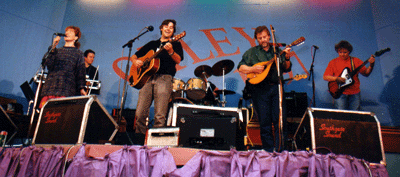
During the time I was playing with Behind the Wall on keyboard, I was also playing drums with Jazz Academy, who I had met while working in London, and as you can find out here, carried on througout the 90s. Tom decided to devote himself full time to music and started to become well known as both a solo performer and also as part of a duo. This lead to the end of Behind the Wall, but a few years later Tom formed the successful Slide. By this time I had started playing with Bayou Gumbo so didn’t join him full time in Slide, but I did play with them a few times on percussion and keys, and once on bass when John hurt his back.
The Family Tree
As I have mentioned several times, the Leeds band scene included a lot of musicians who moved between bands over the year, and at one point, Tom constructed a family tree showing just how intertwined we all were. This is a section of it showing the bands that he was involved with, and the links to the other other bands.
